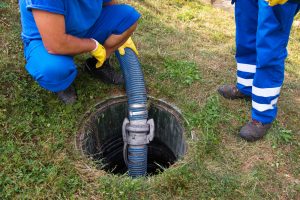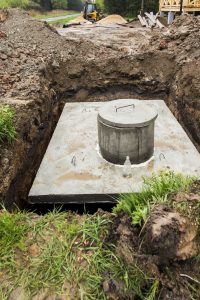If you have recently moved into a home in the Dix Hills area that has a cesspool and you have never had this type of waste removal system before, you probably have a few questions.
Though they are quite common, it seems that a lot of people are unaware of how cesspools work, how they should be maintained, and any signs that indicate a problem with the system. In order to clear up any confusion and ensure that you are familiar with your cesspool, we’ve developed a list of questions that we are frequently asked, as well as our answers to these questions.
Is it really necessary to have a cesspool pumped?
Yes! It’s is absolutely essential. A cesspool is only designed to accommodate a certain amount of water and waste. Though the walls of the tank are porous, which allows some of the wastewater to permeate through to the ground that surrounds it, it’s impossible for all of it to empty in this manner. Moreover, solid waste has no way to exit the tank unless it is pumped. If you fail to have your cesspool pumped, you could be dealing with clogs and overflows in the future, which could pose serious and costly problems.

How often does a cesspool have to be pumped?
The answer to this question varies. For a standard-sized cesspool that is in good working order and isn’t being inundated with waste, every 3 to 5 years is an acceptable timeframe for pumping. However, there are several factors that come into play that will affect how frequently your tank needs to be pumped. For example, older tanks usually have to be pumped more often. Also, if more water than the tank can accommodate is flushing into it, more frequent pumping will be necessary. Lastly, if there are any issues with the tank or the pipes that connect to it, more pumping will be required.
I’ve heard that putting yeast in my cesspool is a good idea. Is it really necessary?
The idea behind adding yeast to a cesspool is this: yeast contains bacteria that can help to break down organic waste. While it can certainly help the process, it isn’t really necessary and it hasn’t been proven to improve the function of a cesspool. The only way to really avoid a backup is to have your cesspool cleaned and pumped on a regular basis.
Should I use other additives in my cesspool?
No! There are a lot of products on the market that claim to assist with the breakdown of waste; however, in reality, many of them do very little. In fact, there are several that contain harsh contents that can actually clog the pipes in your system and increase the risk of overflow. Even worse, some of the ingredients in these products can actually pollute groundwater!
How long does a cesspool last?
That depends on several factors, including the amount and type of waste it is exposed to, whether or not it is maintained, and if there has been any damage (tree roots, vehicles driving on top of it, etc). However, we often find that cesspools start to show signs of trouble when they are about 10 years old or more. If they are taken care of properly and the soil conditions are right, they can last a lifetime.

I just had my cesspool pumped and it seems to be overflowing again. What gives?
There are several reasons why your cesspool might need to be pumped in a short period of time. One of them may be that you are using too much water and the tank can’t hold it all. Another reason could be that there is damage somewhere in the system; for example, a wall may be cracked or a pipe may be malfunctioning.
Where is my cesspool located?
Cesspools can be located anywhere on your property. The only way to accurately determine where it is located is to have a cesspool company assess your property. A professional cesspool installer will examine the plumbing in your home, look for the manhole cover, and use high-tech equipment to find out exactly where your cesspool is situated.
Do I need to take any precautions to prevent my cesspool from overflowing?
Yes! There are several precautions you can take in order to prevent your cesspool from overflowing. Having your system installed, cleaned, and pumped by a professional cesspool installation company is one of the most important things that you can do. Between maintenance calls, make sure that you are mindful of what you are flushing down your drains and toilets. Cesspools are only designed to break down organic matter; inorganic items can cause clogs that can do damage to your system or cause clogs, which can lead to an overflow. Some of the things you should avoid flushing down your drains include cigarette butts; diapers; feminine hygiene products; harsh chemicals; grease; motor oil, and paint. For a complete list of items that aren’t safe for a cesspool, ask a reputable cesspool company.
Can I build anything over my cesspool?
It’s highly unadvised. The weight of the structure could do extensive damage to your cesspool; for example, it could cause cracks in the tank, or it could even make the tank collapse. Additionally, if the structure is permanent, accessing the cesspool will be difficult. Should it become damaged, the structure itself will have to be taken down in order to repair it.
If you have any additional questions about your cesspool, contact Long Island Cesspool at (631) 204-8836. We have been servicing the residents of Dix Hills for more than a decade and will be happy to answer any and all inquiries. We are situated within close proximity to all points of interest, including Dix Hills Park and Otsego Park. We can easily reach your destination via any of the local roadways, such as Deer Park Avenue and Half Hollow Road.

